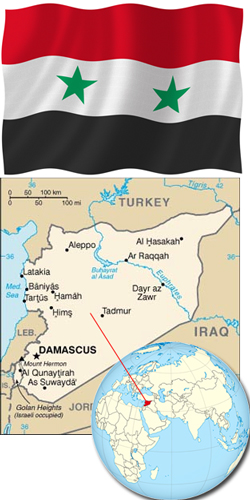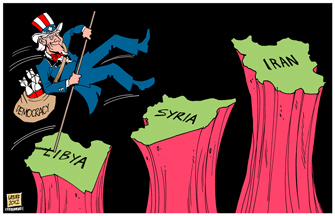Who benefits from a divided Syria?
By Saeed Shabazz -Staff Writer- | Last updated: Aug 13, 2012 - 9:19:56 AMWhat's your opinion on this article?

|
“The partitioning of Syria is the Israeli solution—their overarching goal is to weaken every Arab state by bringing religion and ethnicity into the equation,” James Paul, executive director of Global Policy Forum, told The Final Call. “We do not want to live in a world like that,” he said.
Discussions concerning the possible partitioning of Syria became a hot-button issue in the corridors of the UN after a blogger reported that an unnamed diplomat revealed the plan to partition Syria into three new states—Alawite, Sunni and Kurdish.
Dr. Stephen Zunes, professor of politics and international studies at the University of San Francisco, explained in an e-mail why he disagrees with those who say Syria may be partitioned: “The religious and ethnic divisions in Syria are not so tightly geographically demarcated as to make any kind of partition realistically possible.”
But, Stratfor.com, a provider of geopolitical analysis tended to agree with Mr. Paul saying Syria “could collapse into a Lebanon situation in which it disintegrates into regions held by various factions with no effective central government.”
“Regime change and balkanization in Syria is very closely tied to the objective of dismantling the ‘resistance bloc’ formed by Iran, Syria, Hezbollah, the Palestinians, and various Iraqi groups opposed to the U.S. and Israel,” said Mahdi Darius Nazemroaya, a Canadian-based sociologist, scholar and research assistant at the Center for Global Research in an e-mail to The Final Call.
Mr. Nazemroaya continued: “The road to Tehran is being paved through Damascus and the Syrian government was constantly warned for several years to de-link itself from its Iranian ally and the Arab resistance groups.” Israel and the White House want to see the region in sectarian upheaval where the Arabs are killing one another, he added.
Some observers say more and more the U.S. role in destabilizing the Syrian regime becomes clear, as media headlines Aug. 2 reported a “secret order” signed by President Obama authorizing the Central Intelligence Agency and other U.S. agencies to support rebels fighting to depose Syrian President Bashar al-Assad. News reports also said there is no way of knowing when the president signed the order.
The New York Times on June 21 revealed that the CIA was operating secretly in Southern Turkey helping with the arming of Syrian opposition fighters.
The White House had declined to comment at Final Call press time.
On Aug. 1, a spokesman for the U.S. State Dept. informed the press that the Obama administration had a $25 million budget for “nonlethal assistance” to the Syrian opposition, and had spent approximately $10 million so far. The White House announced Aug. 2 it was providing an additional $12 million in U.S. humanitarian assistance and another $76 million in assistance for food, water, medical supplies, clothing and hygiene kits.
The UN refugee agency said thousands of frightened residents fleeing the violence in Aleppo, Syria’s largest city, are seeking shelter in schools, mosques and public buildings. The Syrian Arab Red Cross said they are registering about 300 displaced families a day.
Well over 70,000 people have sought formal protection in Turkey, while the Jordanian government estimates some 150,000 Syrian refugees have entered since March of 2011. In Lebanon, 34,096 where displaced Syrians are receiving protection and assistance, according to the UN.
“This balkanization process is very dangerous, because it essentially means segregating people. It is the ‘clash of civilizations’ that the neo-cons and their Likud cousins in Israel want,” said Mr. Nazemroaya.
The Christians of Syria like their brethren in Iraq are being forced to flee their ancestral homes, he said.

|
“I want to emphasize that we are not only dealing with a strategy to only divide and destabilize the Arab countries. This is a strategy that targets Africa, Iran, Russia, and Russia’s former Soviet sister-republics, Pakistan and China,” argued Mr. Nazemroaya.
Related news:
The Arab Spring, A Spontaneous Public Uprising, Or Is It? (08-10-2012)
Syria simmers amid UN Security Council deadlock (FCN, 06-07-2012)
The Hijacked Arab 'Spring' (FCN, 03-16-2012)
"Arab Spring" & AFRICOM: U.S. Military Operation to Control Resources (FCN, 03-05-2012)
U.S. Foreign Policy: War, war and more war (FCN, 02-03-2012)
West asserting program in Syria (FCN, 09-15-2011)
How the U.S. Government destabilized foreign governments (FCN, 10-04-2006)
INSIDE STORIES AND REVIEWS
-
-
About Harriett ... and the Negro Hollywood Road Show
By Rabiah Muhammad, Guest Columnist » Full Story -
Skepticism greets Jay-Z, NFL talk of inspiring change
By Bryan 18X Crawford and Richard B. Muhammad The Final Call Newspaper @TheFinalCall » Full Story -
The painful problem of Black girls and suicide
By Charlene Muhammad -National Correspondent- » Full Story -
Exploitation of Innocence - Report: Perceptions, policies hurting Black girls
By Charlene Muhammad -National Correspondent- » Full Story -
Big Ballin: Big ideas fuel a father’s Big Baller Brand and brash business sense
By Bryan Crawford -Contributing Writer- » Full Story






 Click Here Stay Connected!
Click Here Stay Connected!








